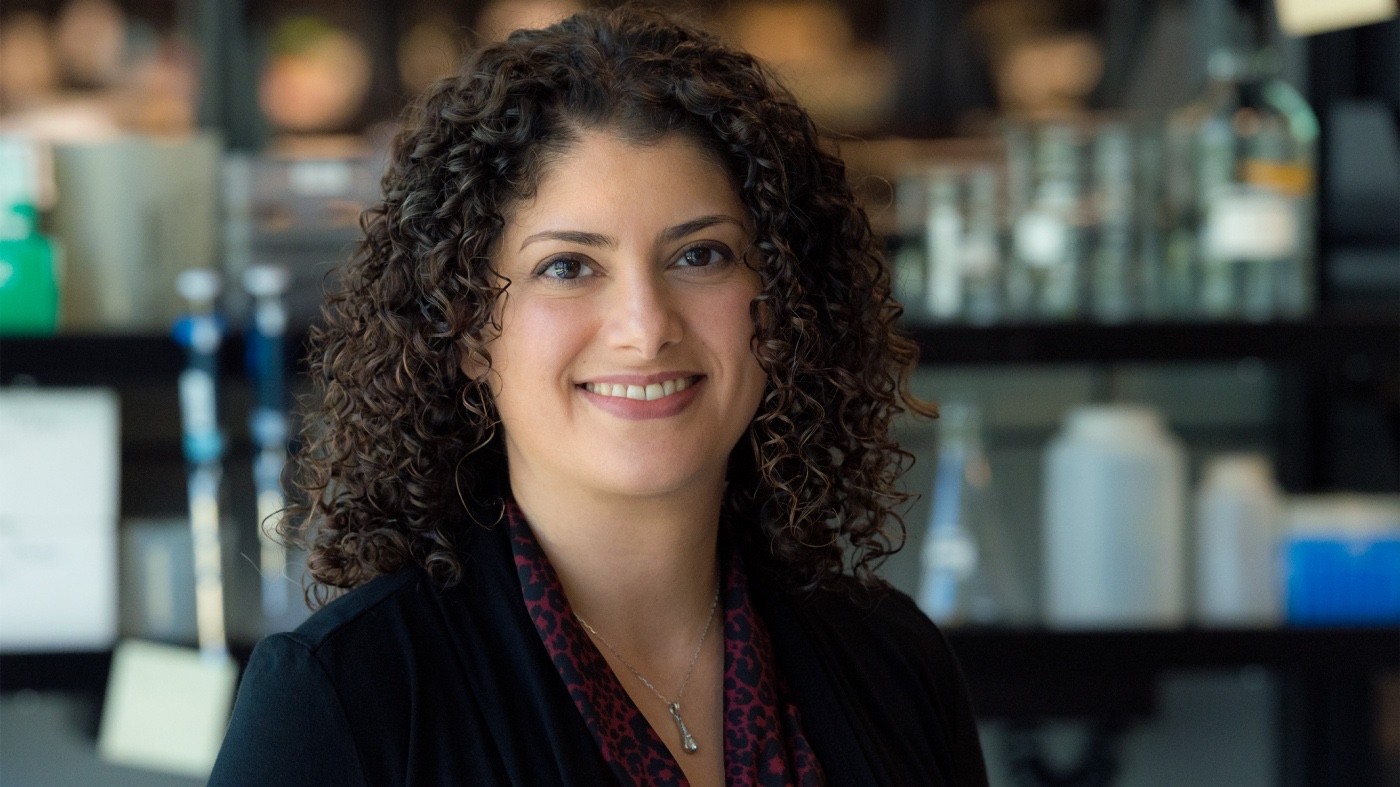
Shomyseh Sanjabi, PhD, an assistant investigator at the Gladstone Institute of Virology and Immunology, received a competitive grant to study the HIV latent reservoir in the gut. [Photo: Chris Goodfellow, Gladstone Institutes]
Shomyseh Sanjabi, PhD, has received an Innovative, Developmental, Exploratory Award grant from the California HIV/AIDS Research Program (CHRP). Her work is aimed at identifying how HIV hides in the gut.
“It is a great honor to receive funding from an organization with such an important mission,” said Sanjabi. “My team and I have been thinking about this problem for some time, and we have started collecting preliminary data to test our unique hypothesis. Thanks to the support from CHRP, we will now be able to complete this research. Our hope is to identify the latent HIV reservoir in the gut and eventually develop therapies to eliminate it, restoring normal health in patients.”
Latent virus in memory T cells is the reason current antiviral drugs cannot cure HIV-infected patients. The reservoir of latent HIV in the gut is poorly understood, especially because resting memory T cells in the gut are different than those in lymphoid tissues and blood. When the virus “hiding” in latent T cells is reactivated, it can spread again. In addition, the reactivated virus causes chronic inflammation that contributes to cardiovascular disease, cancers, cognitive and renal impairment, bone demineralization, and immune dysregulation.
“The gut is one of the main sites where HIV infects cells,” Sanjabi explained. “We need to understand better the latently and actively infected cells there so that we can target and eliminate them.”
Sanjabi’s proposed research focuses on what causes latent versus productive HIV infection in the gut. To do this, she will compare different memory immune cells from gut biopsies of HIV-positive patients with those from healthy controls. She will determine which cells harbor the most latent and productive HIV and examine the cells’ total gene expression to determine how the gut microenvironment contributes to their long-term survival.
The CHRP was founded by the California state legislature in 1983 to respond to the growing HIV/AIDS crisis in the state. The Program fosters outstanding and innovative research that responds to the needs of all Californians, especially those who are underserved, by accelerating progress in prevention, education, care, treatment, and a cure for HIV/AIDS. Its awards foster the next generation of HIV/AIDS researchers, allow established and young investigators to compete successfully for additional funding, support institutional collaborations, and fund critical targeted research. Since the program began, it has funded more than 2,000 research projects and distributed and monitored more than $250 million in state funds for HIV/AIDS research.
“This is a highly competitive grant process,” said Warner Greene, MD, PhD, director of the Gladstone Institute of Virology and Immunology. “This award is a clear validation of the originality and innovation of Shomyseh’s ideas."
Support Discovery Science
Your gift to Gladstone will allow our researchers to pursue high-quality science, focus on disease, and train the next generation of scientific thought leaders.
How Understanding RNA Structure Can Help Researchers Design Better HIV Drugs
How Understanding RNA Structure Can Help Researchers Design Better HIV Drugs
New research sheds light on the biological effect of the many possible three-dimensional structures of a critical loop of RNA in HIV
Research (Publication) HIV/AIDS Virology Ott Lab40 Years of HIV Research: Celebrating the Career of Virologist Warner Greene
40 Years of HIV Research: Celebrating the Career of Virologist Warner Greene
Colleagues look back on Warner Greene's 40 year career
Gladstone Experts History HIV/AIDS Virology Greene LabIn Conversations with Adam Castillejo, the London Patient
In Conversations with Adam Castillejo, the London Patient
Watch this panel discussion that addresses the impact and hurdles associated with developing a cure for HIV
HIV/AIDS Ott Lab



